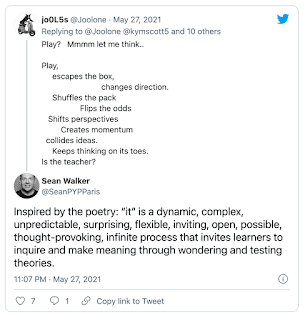What is Play?
Play is central to learning in the Early Years. The PYP includes 3-6 year olds as Early Years, so I have been inquiring into what play actually means. I have enjoyed asking people, engaging in Twitter chats, viewing webinars and reading articles about play.
From Principles into Practice (published by the IB) states, "Play involves choice, promotes agency and provides opportunities to inquire into important concepts and personal interests." It also reminds us: "Play is the primary driver of inquiry."
Often, I read descriptions and characteristics of play more than a definition. This in itself is important as it recognises the complexity of play as a pedagogical approach, a process, an opportunity, and (as stated by at least two wise educators) a state of mind.
Play does not always look the same. I have seen continuums of play, but I am starting to 'play' with the idea of a tangled web that includes the concept of play, different types of play, 'play' as a verb and 'playful' as an adjective. I was lucky enough to have a conversation recently with Jan Mills from the IB about play beyond concrete materials, and the notion of playing with abstract ideas. I was also struck by this tweet:
I was also captivated by Kristjan Järvi's words: "The less definition something has, then the more attracted you are intuitively to it" when discussing Bastille's music in their documentary, ReOrchestrated. I have stopped looking for a one-line definition of play and am more interested in its many facets.
I have started to curate different perspectives and examples of play using this Wakelet. It is fascinating to explore how play is unpacked in so different ways. The first video alone pushes our thinking that play is more than just fun!
There is a state of play! Inquiring into play has helped me to realise that I often live my life (as an adult) in this state of play. I play with possibilities in the classroom and in collaborative planning; toying with ideas as I hatch social plans, travel adventures and ways to see live music! Below is the front cover of a children's story I am looking forward to sharing with Kindergarten, exploring how play is inherent to animals (beyond humans). Do other living things play? How do you know?
Beyond the heated debate about the value of play, there are conflicting views between advocates of play about what might or might not constitute play. One blog I read recently was opposed to the terminology 'play-based learning' suggesting that the essence of play can be hijacked by teachers in "dressing up" activities based on our agendas and calling this play.
What does play mean to you?
I am wondering to what extent we have different values and beliefs about play, or how much of it is a battle of semantics?
How different might learning spaces that promote play and that offer play-based learning look between educators?
Do our ideas about play change depending on the age/developmental level of the children?
How are our different views about play dependent on culture, context and school system? Is there a more significant variable that shapes our thinking?





Comments
Post a Comment